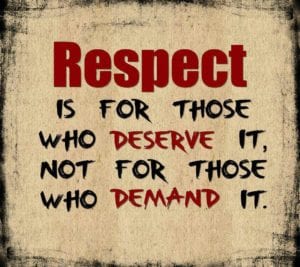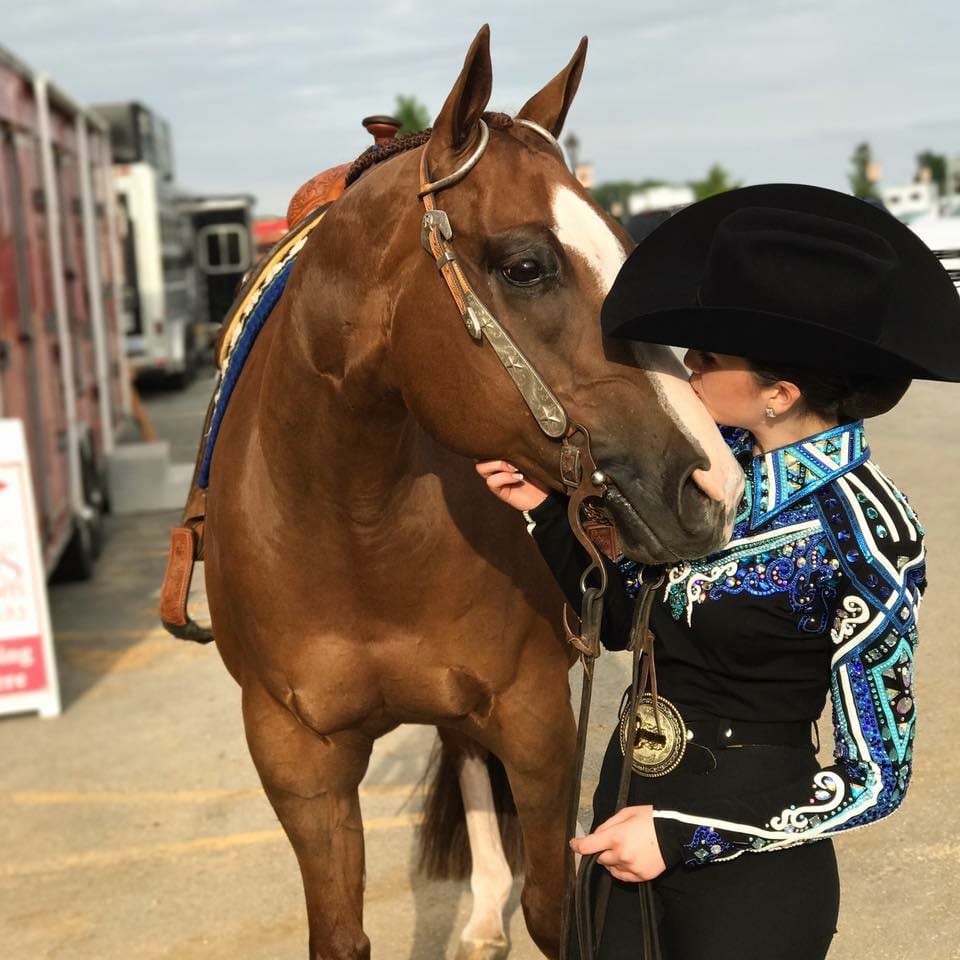It’s safe to say that horse showing teaches us many things. Luckily, many of these lessons can be applied both inside and outside of the arena.
Naysayers might not understand how showing an animal can lend us so many valuable life lessons, but Winston Churchill once said it best with his quote, “There is something about the outside of a horse that is good for the inside of a man.”
While horses alone can teach us a million lessons, showing on the competitive level can also serve as a teacher in itself.
Here are our top five major takeaways that horse showing teaches us.
1) How to Promote Yourself
 Most top exhibitors have learned the art of branding themselves. No, I’m not talking about burning your skin with a hot iron type-of-branding. I’m talking about creating a recognizable presence for yourself on and off of social media. In today’s day and age, where everyone lives vicariously through the internet, it starts to become easy to identify a rider with their online profile. Using carefully selected pictures, logos and any other form of visual media, making yourself recognizable is very beneficial when it comes to horse showing as well as life outside of the barn.
Most top exhibitors have learned the art of branding themselves. No, I’m not talking about burning your skin with a hot iron type-of-branding. I’m talking about creating a recognizable presence for yourself on and off of social media. In today’s day and age, where everyone lives vicariously through the internet, it starts to become easy to identify a rider with their online profile. Using carefully selected pictures, logos and any other form of visual media, making yourself recognizable is very beneficial when it comes to horse showing as well as life outside of the barn.
In essence, judges will begin to connect the dots with who is advertising, who is getting the likes on Facebook and who is showing up in the show ring. The riders who promote themselves garner success just as those who promote themselves in the real world. This can apply to many real-life situations like looking for a job. Prospective employers will gravitate towards a candidate who is actively promoting themselves, whether it be through social media or other forms of advertising. Learning how to become a brand within yourself can give you the competitive edge when it comes to being recognized in and out of your show clothes.
2) The True Meaning of Hard Work
 Showing horses at a young age teaches the value of hard work from early on. Unlike other sports where you can set the ball down and leave it for days or weeks on end, a horse requires daily maintenance and care that must be applied at all times. Caring for horses has no off days regardless if it is 100 degrees outside or 10 below. Horse showing also doesn’t have a specified “season,” as we can compete year round, all over the world. With all of these demands that horse showing requires, it can teach a rider how to work hard.
Showing horses at a young age teaches the value of hard work from early on. Unlike other sports where you can set the ball down and leave it for days or weeks on end, a horse requires daily maintenance and care that must be applied at all times. Caring for horses has no off days regardless if it is 100 degrees outside or 10 below. Horse showing also doesn’t have a specified “season,” as we can compete year round, all over the world. With all of these demands that horse showing requires, it can teach a rider how to work hard.
Besides the endless time and preparation that horses take at home, horse shows are even tougher. Longing, riding, showmanship practice, more longing, riding in the show pen, putting the horse on the walker and then longing again are all just the daily process that can be involved at a show. To put it in more simple terms, horse showing is not for the faint of heart or those with a poor work ethic. Horse showing will test your dedication at all times and push you to go further than you ever imagined possible. This is easily applicable outside of the horse world because everyone appreciates a hard worker and someone who can express this trait is very valuable.
3) Cultivating Meaningful Relationships
 Making lasting relationships with anyone you may encounter is important. From trainers to farriers to vets and so on, this industry usually comes full circle at some point, and the list doesn’t stop there. Horse haulers, brokers, show staff, insurance people, tack store employees, clothing designers, training assistants, chiropractors and even stable mates all perform a crucial role in the equine world and cultivating relationships with each of them is beneficial in the long run.
Making lasting relationships with anyone you may encounter is important. From trainers to farriers to vets and so on, this industry usually comes full circle at some point, and the list doesn’t stop there. Horse haulers, brokers, show staff, insurance people, tack store employees, clothing designers, training assistants, chiropractors and even stable mates all perform a crucial role in the equine world and cultivating relationships with each of them is beneficial in the long run.
All of these people lend a hand in this little thing we like to call horse show life and maintaining a working relationship with all of them can benefit you and your horse. The skill of embracing and entertaining relationships can be helpful in many ways. With many opinionated personalities to weave through, everyone has something to offer when it comes to practical advice and opinions. Besides, horse showing teaches us to never count anyone out because you never know when that friendly face or competitor at the local show will turn into your future trainer, farrier or barn buddy.
4) Fake It Til’ You Make It
 Horses are unpredictable creatures, and with this being said, that can cause some pretty eventful antics both in and out of the show pen. We have all been there. You are showing in a class and your horse decides that it would rather be doing anything other than listening to your commands. However, instead of just giving up, you can never let the judges see you sweat. In the meantime, you must maintain your composure and pretend like you are having the ride of a lifetime instead of expressing your true feelings of anger.
Horses are unpredictable creatures, and with this being said, that can cause some pretty eventful antics both in and out of the show pen. We have all been there. You are showing in a class and your horse decides that it would rather be doing anything other than listening to your commands. However, instead of just giving up, you can never let the judges see you sweat. In the meantime, you must maintain your composure and pretend like you are having the ride of a lifetime instead of expressing your true feelings of anger.
Sure, it can take everything to pretend things are going well when in reality, your horse is having a meltdown. Learning to keep your composure can apply to the outside world as well. Whether it is dealing with animals or people, everyone has a mind of their own and will eventually do something to rub you the wrong way. Instead of blowing up, keeping your calm and pretending like everything is going great will usually be the smartest mindset to maintain. Horse showing will test your limits both physically and emotionally, but learning to cope positively can benefit you, your horse and those in your everyday life.
5) Ask Instead of Demand
 When communicating with horses, it is often important to ask for what we want instead of demanding it to be given to us. The quote, “you can catch more bees with honey than you can with vinegar,” rings true in the equine world time and time again. Some horses can be pushed a lot harder than others, and some will take a lot of coaxing to get them to do their job. People can be the same way as everyone is different, much like horses. Learning to read the expressions and body language of animals and people takes work, but being able to do so has its perks.
When communicating with horses, it is often important to ask for what we want instead of demanding it to be given to us. The quote, “you can catch more bees with honey than you can with vinegar,” rings true in the equine world time and time again. Some horses can be pushed a lot harder than others, and some will take a lot of coaxing to get them to do their job. People can be the same way as everyone is different, much like horses. Learning to read the expressions and body language of animals and people takes work, but being able to do so has its perks.
When you rely on demanding what you want, it can upset and anger some people as well as horses. Though demanding may be our first instinctive reaction, learning the value of asking will usually garner a better response. Not all people can be approached in an abrasive manner, and in simpler terms, some will not handle your demands with a positive reaction. Attempting to ask rather than demand is a safer alternative when it comes to horse showing and real life.
What is the most important lesson that you have learned from showing horses? Let us know in the comments.









